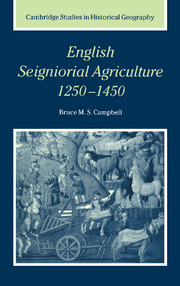Book contents
- Frontmatter
- Contents
- List of figures
- List of tables
- Preface and acknowledgements
- Abbreviations
- Weights, measures, values, and boundaries
- 1 Introduction: agriculture and the late-medieval English economy
- 2 Sources, databases, and typologies
- 3 The scale and composition of the seigniorial sector
- 4 Seigniorial pastoral production
- 5 Seigniorial arable production
- 6 Crop specialisation and cropping systems
- 7 Arable productivity
- 8 Grain output and population: a conundrum
- 9 Adapting to change: English seigniorial agriculture 1250–1450
- Appendix 1 Demesne-level classification of husbandry types
- Appendix 2 Demesnes represented in the Norfolk accounts database
- Appendix 3 Demesnes represented in the FTC accounts databases
- Consolidated bibliography
- Index
- Cambridge Studies in Historical Geography
8 - Grain output and population: a conundrum
Published online by Cambridge University Press: 20 October 2009
- Frontmatter
- Contents
- List of figures
- List of tables
- Preface and acknowledgements
- Abbreviations
- Weights, measures, values, and boundaries
- 1 Introduction: agriculture and the late-medieval English economy
- 2 Sources, databases, and typologies
- 3 The scale and composition of the seigniorial sector
- 4 Seigniorial pastoral production
- 5 Seigniorial arable production
- 6 Crop specialisation and cropping systems
- 7 Arable productivity
- 8 Grain output and population: a conundrum
- 9 Adapting to change: English seigniorial agriculture 1250–1450
- Appendix 1 Demesne-level classification of husbandry types
- Appendix 2 Demesnes represented in the Norfolk accounts database
- Appendix 3 Demesnes represented in the FTC accounts databases
- Consolidated bibliography
- Index
- Cambridge Studies in Historical Geography
Summary
Total grain output
Medieval English diets were dominated by grain, consumed as pottage, bread, and ale. Grain also bulked large in the diet of man's most powerful working animal, the horse. The aggregate volume of grain output thus determined the size of the population that could be supported and the amount of work it was capable of undertaking. Yet national grain output is not accurately recorded until the advent of official agricultural statistics in 1871. Surrogate sources which cast direct light on this issue are few. They include the 1801 Crop Returns and the Nonarum inquisitiones of 1340–1, whose under-exploited returns – part published and part unpublished – constitute a minefield for the unwary. Unfortunately, the utility of both is marred by incomplete survival. For want of a better alternative, indirect methods of estimating grain output have therefore to be relied upon.
By combining estimates of the total grain area with evidence of the composition of that area (Chapter 5) and the per-acre yield of the individual grain crops (Chapter 7) provisional estimates of aggregate grain output can be constructed for the two benchmark dates, c. 1300 and 1375 (Tables 8.02 and 8.03). A third and altogether more speculative estimate calculates what the volume of grain output would have been in 1086 if patterns and productivities of cropping roughly equivalent to those in c. 1300 had prevailed (Table 8.04).
- Type
- Chapter
- Information
- English Seigniorial Agriculture, 1250–1450 , pp. 386 - 410Publisher: Cambridge University PressPrint publication year: 2000

